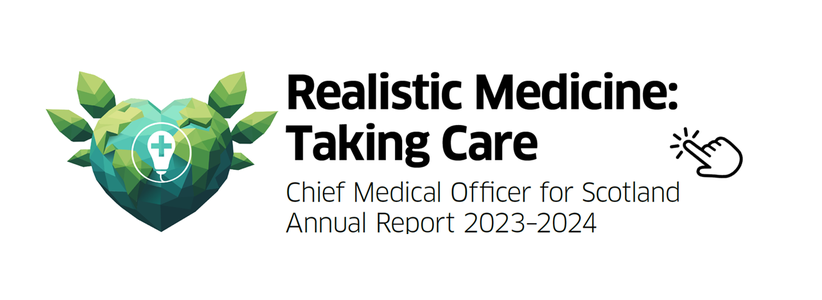Chief Medical Officer’s report foregrounds importance of Scottish research for improving and saving lives

21st August 2024
Scotland’s Chief Medical Officer (CMO) has expressed his pride in the life-saving research expertise that the country continues to provide both domestically and on a global scale
In Professor Sir Gregor Smith’s new Annual Report 2023-24 – entitled Realistic Medicine: Taking Care – he champions the powerful contribution which research makes to a modern, sustainable healthcare system.
He states: “I am proud of the research that Scotland has given the world – the lives it has improved as well as the lives it has saved.
“Research is vital in delivering care that matters. It sits at the heart of evidence-informed practice.”
Sir Gregor says he recognises that the burden of disease in Scotland is expected to increase by 21% over the next 20 years with climate change already impacting society’s most vulnerable.
However, the CMO believes research can help to “refine and validate new technologies, techniques and treatments” while fostering “collaboration between healthcare professionals, scientists and patients to drive improvements in care and outcomes”.
The report celebrates Scotland’s contribution to medical developments, and our NHS being a world-leader in healthcare quality and research, but notes that we must “continue to build on our successes to meet the changing needs of the people of Scotland”.
Realistic Medicine: Taking Care notes that the General Medical Council (GMC) now advises collective encouragement and support of opportunities for research across the country.
“In doing so, we can collaborate with the people we care for and make a real and positive difference to the health and wellbeing of Scotland,” Sir Gregor states.
Support for medical research across the country is pinpointed in the report with recognition of over 300,000 registered for SHARE, The Scottish Health Research Register and Biobank; and ‘powered-by-people’ initiatives like Generation Scotland, providing valuable insight on long-term health and wellbeing thanks to over 7000 families taking part
Sir Gregor notes he is “delighted to hear that we have such an enthusiastic movement of people supporting medical science across the country”. He encourages even more volunteers and support, noting “the more we understand about the biology and biography of the people of Scotland, the greater scope we have to tailor healthcare to the individual”.
The report backs the Patient and Public Involvement (PPI) ethos that “empowering people to play an active role in our vibrant research community, whoever and wherever they are in Scotland, means meaningful inclusion,” helping to reflect the diversity of Scottish society and producing better outcomes.
Leading research trials are highlighted in the report including EAVE II led by researchers at the University of Edinburgh. This enhanced surveillance study tracked the impact of the COVID-19 pandemic and provided the first real-world data on vaccine effectiveness. The research team managed this in near real-time across Scotland using a rich dataset of all 5.4 million people registered with a GP, around 98% of the Scottish population. The impact of the study has been profound, with Sir Gregor noting it “shows the outsize impact we can have on people’s lives, not just in the UK, but around the world”.
Scotland as the home of Precision Medicine is also recognised with leading studies across diabetes (iDiabetes), liver disease (PRaCTicAL), multiple sclerosis (Precision MS) and critical care (TRAITS) highlighted in the report. This research aims to tackle health conditions of major importance in Scotland, including diseases that disproportionately impact on those at risk of socioeconomic disadvantage.
Adopting an approach to healthcare which is designed to engender earlier diagnoses, targeted treatments and prompt interventions, Sir Gregor believes that “the right plan, and the right treatment at the right time, will increase our chances of delivering careful and kind care, as well as the outcomes that matter”.
Further helping to place Scotland on the world map, the CMO says that The Research Excellence Framework – the UK’s peer-review process for assessing quality of research in higher education providers – had reported that each of Scotland’s 18 universities is involved in “world-leading” research and 86% of their research output is “internationally excellent”.
Sir Gregor acknowledges that “big challenges coming our way” but insists “we cannot afford to move away from our pursuit of research excellence and especially our need to innovate. This is how we ensure that we improve and deliver careful, kind, more sustainable care”.
As a leading contributor, Chief Scientist for Health, Professor Dame Anna Dominiczak encourages dedication in our strive for research and innovation excellence, noting: “The most satisfying thing for me is taking discoveries, new things, from bench to bedside for the benefit of the people we care for – this is my passion. I want it to be your passion too – innovation, science and technology applied to your clinical arena.”

